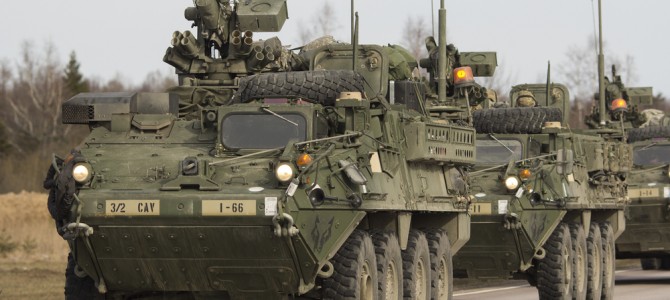
Donald Trump and Hillary Clinton are poised to be the standard-bearers for their respective parties, and the American electorate is eager for an alternative. Libertarians now have a chance to present a credible alternative to the hawkish and increasingly anti-free trade Republican and Democratic parties.
Google searches for the Libertarian Party soared after Ted Cruz suspended his presidential campaign, effectively handing the nomination to Trump. However, taking advantage of this will require libertarians to reject their isolationist tendencies and embrace America’s role of maintaining peace and prosperity throughout the world.
Libertarians rightly claim trade and diplomacy are more effective at ensuring security than war. But they ignore the role America’s military preeminence has played in facilitating the post-World War II environment of peaceful trade and commerce around the globe.
Free and open maritime trade, for example, did not occur by accident. It was deliberately implemented as part of the post-World War II system of international diplomacy. For almost 70 years, the U.S. Navy has ensured and protected this system, enabling countries from across the globe to engage in mutually beneficial trade. Abandoning this role would only allow the enemies of this world order to reshape the international community towards their own narrow interests, at the expense of peace and prosperity.
Left to Itself, the World Becomes More Dangerous
Russia’s recent aggression towards its neighbors in Georgia and Ukraine and China’s antagonism in the South China Sea demonstrate that both of America’s main rivals are more interested in indiscriminate force than in ensuring peaceful coexistence.
China aims to use its growing presence in the South China Sea to control and limit trade routes. Half of the world’s merchant fleets travel through chokepoints in the South China Sea, which, if restricted, could precipitate a dramatic increase in shipping costs, and ultimately a higher cost of living for price-sensitive consumers. Ceding control of these chokepoints would give China unfathomable power and influence across the world.
Chinese control of the South China Sea would also lead to a monopoly on valuable fisheries, cutting off supplies to fishermen from Vietnam, Indonesia, the Philippines and other regional actors that rely on the waters for sustenance.
By all objective measures, keeping the South China Sea free and open for trade and commerce is in America’s national interest. Libertarians are right to be wary of military confrontation with China, but they should appreciate America’s unique ability to provide diplomatic support to Vietnam and the Philippines when their regional sovereignty is threatened by China’s aggression.
U.S. Strength Promotes World Peace
Calls to withdraw U.S. troops from South Korea and Japan, often supported by libertarians, are similarly shortsighted, as they fail to recognize how America’s presence has preserved peace and prosperity in the region.
Since 1953, U.S. forces on the Korean Peninsula have deterred North Korea from launching an attack on its southern neighbor. Such deterrence has allowed South Korea to mature into a free and prosperous democracy and one of our most critical allies in the region. The U.S. military presence in South Korea has created a unique partnership between the two countries that includes economic and cultural trade. Without the U.S. military presence, South Korea would likely have been consumed by communist North Korea long ago, and the world would be without its twelfth-largest economy and one of its most innovative technology manufacturers.
Strategically positioning overseas bases also enables the United States to respond quickly and decisively when military force is required. One of the most critical components of war is sustaining logistics line to support operations. Quickly reacting to legitimate crises would be virtually impossible if our military were forced to deploy personnel and equipment thousands of miles from U.S. shores to conduct operations overseas.
Staging forces in Kuwait prior to both Iraq Wars allowed the United States to quickly destroy the Iraqi Republican Guard in both instances. Without this infrastructure, the war may have been longer lasting and more costly. After Typhoon Haiyan decimated the Philippines in 2013, the United States was able to quickly deploy an Air Force squadron from Japan to partake in disaster relief efforts.
Of course, war should always be preserved as the last resort; but when American forces do engage in military or humanitarian interventions, then it is America’s duty to place our troops in the best position to accomplish their mission.
Don’t Throw Out the Baby
The ideologically zealous isolationist might argue that the United States should never involve itself in the affairs of other nations, even if the rest of the world is war-torn or stricken by natural disasters. This thinking is myopic. American interests are best served when the world is peaceful and prosperous. World War II and the terrorist attacks of September 11 taught us that the United States cannot retreat to within its borders and expect the world to leave us alone.
This doesn’t mean the United States should be engaged in all conflicts at all times. The United States should only engage in war to protect our direct national interests. Regime change, democracy promotion, and preemptive attacks undermine our security and foster instability throughout the world—on this, libertarian instincts are unassailable. Indeed, American military interventions in Iraq, Libya, and many other locations have ended in abject failure. Intervening in Syria would be disastrous, and provocations in Ukraine are unnecessarily risky.
However, libertarians must not misinterpret these failures. The United States can still be a force for good in the world, and if libertarians are serious about providing a credible alternative this election and shifting U.S. foreign policy towards a position of restraint, then they must accept this fact.
An isolationist America would embolden the enemies of the current world order, allowing them to reshape the international community towards interests antithetical to global peace and prosperity.









